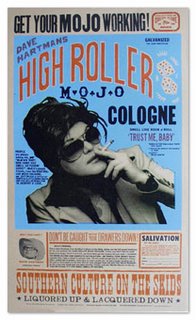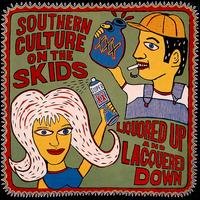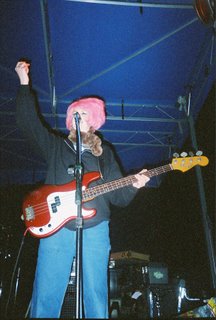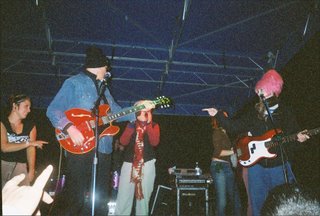Appalachian Stereotypes in Art (Part 2)
 We have seen that the hillbilly stereotypes that are stuck on
We have seen that the hillbilly stereotypes that are stuck on
Visual artists are not the only ones that pursue the white trash aesthetic. Many musicians also use these ideas to create a musical style that attracts legions of fans. We will take a look at one band in particular that for over twenty years has been amplifying Appalachian stereotypes with some very fun results.
Southern Culture on the Skids is seemingly constantly touring and bringing their raucous shows to venues around the country. Their shows are loud, exciting and very much in tune with the often-swept-under-the-rug side of
 Before considering the music, one must first look at their name: Southern Culture on the Skids. The name perfectly attracts the music fan in search of good old fashioned blue collar fun. “Southern,” the first word in the band’s name proudly announces its roots, while the last four, “Culture on the Skids,” unashamedly proclaims their musical intention: to embrace the proud rabble-rousing tradition that is so easily identified with southern
Before considering the music, one must first look at their name: Southern Culture on the Skids. The name perfectly attracts the music fan in search of good old fashioned blue collar fun. “Southern,” the first word in the band’s name proudly announces its roots, while the last four, “Culture on the Skids,” unashamedly proclaims their musical intention: to embrace the proud rabble-rousing tradition that is so easily identified with southern
On its own, this is a musical attraction fairly familiar to American listeners. The Country Top-40 chart is littered with acts that serve as proclamations of the redneck lifestyle to the masses. Acts like Shooter Jennings, Hank Williams, Jr., and Kenny Chesney all sing the song of the redneck. These should not be ignored in a complete analysis of Appalachian stereotypes in culture. For one thing, their success is unimpeachable. But bands like Southern Culture on the Skids present a more targeted approach to these images. Whereas Toby Keith asks listeners (quite lamely, I would submit) to “Get Drunk and Be Somebody,” SCOTS sings about the ecstasy of a “Dirt Track Date.” Anyone can get drunk and foolish, but
Southern Culture on the Skids play an upbeat hybrid of  trio, though from time-to-time they feature other players. One thing that concert-goers will notice is that this band is good. Like their music or not, no one can deny that Southern Culture on the Skids is a tight band with fun rhythms, blistering leads and strong vocal work. Rick Miller (guitar, vocals), Mary Huff (bass, vocals) and Dave Hartman (percussion) put on loud, rowdy and very interactive shows. Audience participation is a hallmark of every SCOTS concert. They are known for throwing out fried chicken into the audience while playing standards like “Eight Piece Box,” and “Liquored Up and Lacquered Down.” A few years back, at a mountain festival where fried chicken was scarce, the band improvised with a substitute, naturally: white bread. At some point during the performance the girls in the audience are invited to come up onto the stage and dance with the band.
trio, though from time-to-time they feature other players. One thing that concert-goers will notice is that this band is good. Like their music or not, no one can deny that Southern Culture on the Skids is a tight band with fun rhythms, blistering leads and strong vocal work. Rick Miller (guitar, vocals), Mary Huff (bass, vocals) and Dave Hartman (percussion) put on loud, rowdy and very interactive shows. Audience participation is a hallmark of every SCOTS concert. They are known for throwing out fried chicken into the audience while playing standards like “Eight Piece Box,” and “Liquored Up and Lacquered Down.” A few years back, at a mountain festival where fried chicken was scarce, the band improvised with a substitute, naturally: white bread. At some point during the performance the girls in the audience are invited to come up onto the stage and dance with the band.
At a recent
While SCOTS enthusiastically explores this subject matter in its music, it should be noted that their songs are decent. For the most part, SCOTS songs are void of nastiness. It’s more outrageous humor than vulgarity.
It is interesting to compare the Southern Culture on the Skids subject matter to the band’s listeners. It would be easy to estimate that SCOTS attracts the very characters about which they so boldly sing, and they probably do to some e xtent. One thing, though, is certain: The SCOTS audience is diverse. Personally, I have been to Southern Culture on the Skids concerts alongside people from a variety of different backgrounds. One is likely to find professionals, academics, students, artists and an infinite number of other types at a SCOTS show. Further evidence of their broad appeal is the fact that Southern Culture on the Skids has a song featured on the soundtrack to the mainstream teen blockbuster, I Know What You Did Last Summer.
xtent. One thing, though, is certain: The SCOTS audience is diverse. Personally, I have been to Southern Culture on the Skids concerts alongside people from a variety of different backgrounds. One is likely to find professionals, academics, students, artists and an infinite number of other types at a SCOTS show. Further evidence of their broad appeal is the fact that Southern Culture on the Skids has a song featured on the soundtrack to the mainstream teen blockbuster, I Know What You Did Last Summer.
***
So what do artists like the folks at Yee-Haw, and Southern Culture on the Skids contribute to Appalachian culture? For one thing, their success cannot be denied. Bands simply do not stay together for twenty years unless they are making a living, and Yee-Haw Industries is garnering praise from all over the world. So if these artists are enjoying success, then it stands to reason that their audiences are enjoying the consumption of their creations. I certainly am. But as
I believe that it does. If a culture cannot look inward for inspiration, where can it look? If we were to look elsewhere for inspiration, we would be effectively handing over our identity. We are
**note: Some pictures featured in this piece were taken in 2004 at a festival in




2 comments:
It is hard to walk that line.
SCOTS definitely exploits Appalachian culture for their own benefit but that doesn't mean that they aren't also advocates for that same. Spend a few years with the folk at The Empty Glass in Charleston, WV. Those outside the Hillbilly Underground community may think that SCOTS and other such acts are ridiculing Appalachians but the community knows better. Given that this is not a genre of music or a sub-culture that comes into contact with the mainstream often, there is not much of an opportunity for confusion.
But at the risk of getting preachy and throttling the fun, when ones motives are called into question it behooves the parties to be very clear that they are promoting Hillbilly culture not denigrating it. As a member of a psychobilly band playing in Columbus, Ohio in the early 90s, I had to more than once say, “I am not making fun of Hillbillies; I am a Hillbilly. A very proud one at that.”
Being a Native, there are many things an outsider to Appalachia cannot understand. And, in a round about way, it keeps this place from being affected. Culturally speaking. This image of bare foot, overall wearing, moonshine cookin', backer spittin', bunch of inbreds keeps the outsiders from changing the Appalachian heritage. But, that's just the case because it has always been "do with what you have" here.
Post a Comment